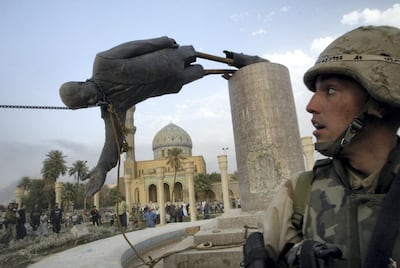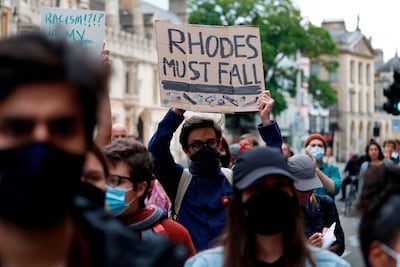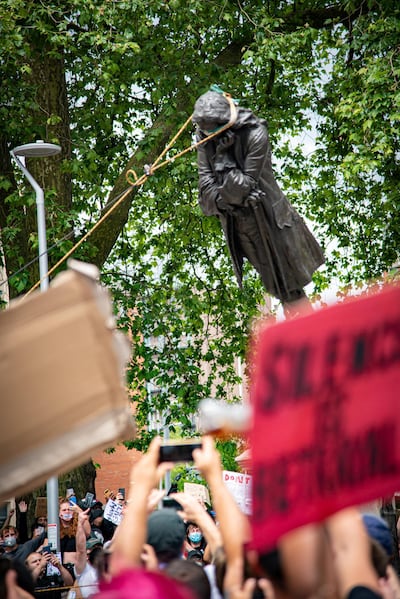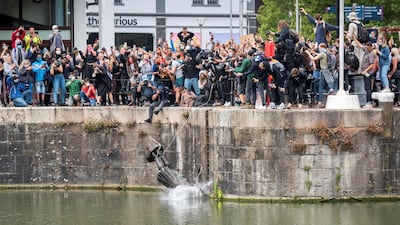In 2003, on April 9, American forces took control of Baghdad. One of the lasting images that day was of US troops in Firdous Square using an armoured vehicle to tear down a statue of former Iraqi dictator Saddam Hussein. Should that be seen as a symbolic gesture or an empty act of feel-good vandalism?
Earlier this week, in the wake of the George Floyd killing, protesters in the English city of Bristol also tore down a statue, rolled it through the streets and dumped it in the river Avon.
The toppled effigy commemorated Edward Colston, a wealthy merchant heavily involved in the transatlantic slave trade.

During the latter part of the 17th century, Colston's ships are estimated to have transported around 80,000 human beings – men, women and children – from their African homelands to the Americas. The human cargo, at least those that did not die en route, would generally be dehumanised on arrival.
They might be stripped of their names, language, culture, religion and heritage while being worked to death. It is not that hard to see why some people might find a celebratory statue of the slave-trading Bristolian big-man a little offensive.
I was born and grew up in Liverpool, a city that also boomed as a consequence of the transatlantic slave trade. At its peak, Liverpool eclipsed Bristol and London, controlling over two thirds of British involvement in this reprehensible trade in human life.
According to the slave trade records of the British Archive, Liverpool's ships were responsible for transporting over 1.1 million human beings – men women and children – from their African homelands to the Americas. In terms of today's population, that would be the equivalent of around eight million souls, a little shy of the entire population of the UAE.
Like Bristol, my city also has many mementos of this macabre past. From weather-beaten bronze effigies of slave-traders to the very names of the streets I played on as a child: Earle road, Rodney street, Penny Lane, all named after individuals involved in the transatlantic slave trade.
Penny Lane, made famous by the Beatles' song, is named after James Penny, a slave ship captain who actively campaigned against the abolition of the lucrative trade in human beings. I love the song, but James Penny was on the wrong side of history.
In 2003, the Saddam Hussein Mosque in Birmingham was renamed. Penny Lane remains Penny Lane.
For many, Colston's statue and numerous others are symbolic reminders of a painful past. This past is not such a distant past, either. The British formally abolished slavery in 1833, and this "moral evolution" reached the US in 1865. We are talking about just over a century and a half ago. The great grandparents of people alive today, bought, owned and sold their fellow human beings.

When the transatlantic slave trade was no longer morally tenable, and slavery was abolished, the British government paid millions in compensation to those involved in the trade. The government paid absolutely nothing to those who were enslaved. This injustice was just the first of many emancipation-era injustices that would be endured and overcome by the displaced human beings taken from Africa to help build the Americas.
This injustice, born of racism, continues in many forms, one highly visible manifestation being the treatment of black men and women by law enforcement officers. I witnessed this firsthand growing up in Liverpool. I remember the police being given enhanced powers to stop and search; so-called "sus laws".
The new powers were overused heavy-handedly in the Black community – my community– and the ensuing police brutality triggered wide-spread civil disturbance. It was the summer of 1981, the unrest was later known as the Toxteth riots, and along with rubber bullets, the police also used tear gas for the first time in mainland Britain.
The viral images of George Floyd being slowly asphyxiated by a white Minneapolis police officer re-opened an enduring wound. For some, it shone a light, perhaps for the first time, on the injustices faced by Black people in the Americas. Injustices that date back to around the time Edward Colston, James Penny and others began trading in human beings.
When the protesters toppled Edward Colston's statue last week, there were mixed responses. Some called it an act of mindless vandalism and an attempt to erase history.
Others, such as UK's Labour party leader, Sir Keir Starmer, objected to the means but not the ends, saying on Twitter that: "Edward Colston was responsible for 100,000 people being moved from Africa to the Caribbean as slaves. 20,000 died en route. The statue shouldn't have been taken down in the way it was. But it should have been removed from our streets a long time ago."

A Bristol school, Colston's Girls' School, almost immediately took down a statue of their slave-trader founder after last week's incident. They are also now considering renaming the school. Similarly, Colston Hall, a city centre arts venue, is now planning a name change for later this year.
On June 9, the London Borough of Tower Hamlets announced that it had removed the statue of the slave trader, Robert Milligan, that formerly looked out over West India Quay. The Borough also suggested that it was reviewing other local monuments.
Removing statues and renaming streets and civic buildings are all symbolic gestures. At best, they symbolise an appetite for change, a desire to be better. However, without real and not just symbolic efforts to address past and present injustice, these gestures remain an empty sideshow. So long as there is injustice, there will be unrest.
Police brutality is unjust whether it occurs on Malcolm X Boulevard, Colston Avenue or Penny Lane. Racial discrimination is reprehensible whether it happens within eye-shot of a bronze effigy of Nelson Mandela or Robert Clive (Clive of India).
Newborns have become adults since the toppling of Saddam Hussein's statue in Baghdad. Did the felling of the statue lead to peace, prosperity and justice in Iraq? Not yet, at least.
Symbolic acts, especially destructive ones, often remain empty gestures. We need to go way beyond symbols and slogans to build increasingly just, fair and tolerant societies.
Justin Thomas is a professor of psychology at Zayed University


